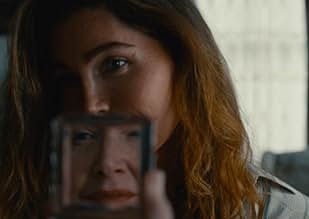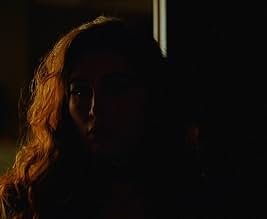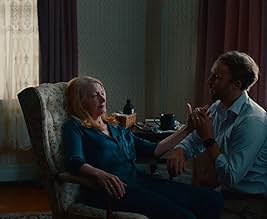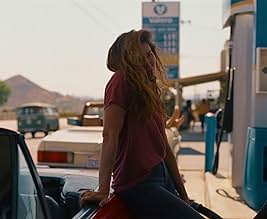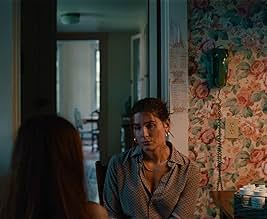AVALIAÇÃO DA IMDb
6,3/10
1,7 mil
SUA AVALIAÇÃO
O retrato íntimo de uma mulher que volta para casa para cuidar de sua mãe que está morrendo. Uma história delicada e cheia de nuances de uma família dividida, que explora temas universais de... Ler tudoO retrato íntimo de uma mulher que volta para casa para cuidar de sua mãe que está morrendo. Uma história delicada e cheia de nuances de uma família dividida, que explora temas universais de abandono, envelhecimento, aceitação e redenção.O retrato íntimo de uma mulher que volta para casa para cuidar de sua mãe que está morrendo. Uma história delicada e cheia de nuances de uma família dividida, que explora temas universais de abandono, envelhecimento, aceitação e redenção.
- Direção
- Roteiristas
- Artistas
- Prêmios
- 5 vitórias e 17 indicações no total
Vladimir John Perez
- Car Repairman
- (as Vladimir Perez)
Bobby Easley
- Trucker
- (as Bobby Easly)
Bryant Bentley
- Mechanic
- (as Bryant Lewis Bentley)
Chelo
- Hairdresser
- (as Chelo Acosta-Conley)
Mark Angel
- Mechanic
- (não creditado)
- Direção
- Roteiristas
- Elenco e equipe completos
- Produção, bilheteria e muito mais no IMDbPro
Avaliações em destaque
"Monica" is a profoundly moving drama directed by Andrea Pallaoro, encapsulating the poignant journey of Monica, sensitively portrayed by Trace Lysette, a transgender woman facing the ghosts of her past while tending to her terminally ill mother, played by Patricia Clarkson. The film delicately unravels the complexities of familial rejection, hurtful memories, and the pursuit of forgiveness. Pallaoro crafts a mesmerizing slow burn, each scene pulsating with intense emotions, yet wrapped in delicate vulnerability. The movie intricately navigates the intricacies of human connections, depicting the nuances of reconciliation and the profoundness of healing. Lysette's performance is remarkable, carrying the weight of Monica's emotional journey with authenticity, while Clarkson delivers a compelling portrayal that adds depth to the narrative. The cinematography beautifully captures the essence of each moment, elevating the film's impact. "Monica" stands tall with its exceptional storytelling, powerful performances, and a heartfelt exploration of acceptance, making it a definitive 10/10 movie experience.
Acceptance, reconciliation and forgiveness are arguably among the hardest feelings for many of us to deal with, but coming to terms with them is by no means impossible. When Monica (Trace Lysette), a transgender woman kicked out by her family as an adolescent, leaves her Midwestern home and heads to California to start a new life, she struggles to get by. And, after years of effort, she indeed manages to work it out for the most part. But, years later, when Monica's sister-in-law (Emily Browning) informs her that her long-estranged mother (Patricia Clarkson) is terminally ill, she's torn about what to do. Should she ignore the news or step up as a dutiful child? She reluctantly relents and heads back to Ohio to help care for the woman who threw her out of the house, a situation made more complex by the fact that her mother's malignant brain tumor has seriously affected her memory, leaving her unaware of the identity of the new caregiver who has suddenly appeared in her life. Writer-director Andrea Pallaoro's third feature outing presents a deftly nuanced, sensitively handled story of a family painfully torn apart trying to put itself back together again under trying circumstances and while there's still time. The pacing comes across as somewhat slow (undoubtedly by design), so those expecting material that moves along at a brisk, breezy may not find it to their liking, but, given the profound nature of the subject matter, it suits the narrative perfectly. There are admittedly a few plotline gaps here and there, but they're more than adequately compensated for by the film's superb ensemble cast, razor-sharp writing and gorgeous, atmospheric cinematography. "Monica" may not have received much fanfare upon its theatrical release earlier this year, but this fine streaming offering is well worth the time, providing viewers with a moving cinematic experience that many of us can probably relate to - and whose wisdom should be thoughtfully considered should the need arise in one's life.
Synchronicity brings me another film of soul growth. No doubt about that. No doubt it's unique. And no doubt I'll be slow finding words. The director and lead actress will be at tonight's showing. I'll just jump ahead now and suggest you add this to your list.
The film is deeply, and I want to say uniquely, sincere. And non-verbal. There's a flow of subtle feeling, along with familiar emotions. A lot is happening through veering away from, or toward, cultural expectations. Even so, in the writing, the acting, and the cinematography there's a complete lack of rhetoric, or attention-grabbing, or self-conscious brush strokes. (Like a Vermeer: no visible brushstrokes.) Music comes from the camera: the light, the shifting angles, and the distance. (Huh! That's also Vermeer.) Grace enters mysteriously. (Also.)
Marshall Shaffer has written a sensitive review.
The film is deeply, and I want to say uniquely, sincere. And non-verbal. There's a flow of subtle feeling, along with familiar emotions. A lot is happening through veering away from, or toward, cultural expectations. Even so, in the writing, the acting, and the cinematography there's a complete lack of rhetoric, or attention-grabbing, or self-conscious brush strokes. (Like a Vermeer: no visible brushstrokes.) Music comes from the camera: the light, the shifting angles, and the distance. (Huh! That's also Vermeer.) Grace enters mysteriously. (Also.)
Marshall Shaffer has written a sensitive review.
"Monica"
"Monica" is a portrait of a woman who returns home to the Midwest for the first time in 20 years to confront the wounds of her past. Reconnecting with her mother Eugenia (Patricia Clarkson) and the rest of her family for the first time since leaving as a teenager, Monica (Trace Lysette) embarks on a path of healing and acceptance. Monica is reunited with her family for the first time since her youth. Uncertain if her mother will recognize her, Monica moves into her childhood home, hoping to heal the wounds of the past and forge a new path of forgiveness and acceptance. Exploring the universal thematic dichotomies of aging and beauty, rejection and alienation, the film details Monica's world and state of mind, the pain and fear, the needs and desires, of a woman whose journey ultimately illuminates the human condition. The film delves into Monica's internal world and state of mind, her pain and fears, her needs and desires, to explore the universal themes of abandonment and forgiveness.
Monica is a film about family, abandonment, and acceptance. It's also a film that centers a Trans-woman character. Monica has been on her own since her mother dropped her off at the bus station as a teenager with only 5 minutes to spare and the message, 'I can't be your mother anymore'. We don't follow Monica during those early teen years, and that time is only hinted at. We meet her as an adult, but one that still carries that wound of early abandonment that we get the first taste of very early in the film when she calls Jimmy (Joshua Close). Jimmy is a man we never see who we only know through her attempts to contact him, but we see and hear the need to try and keep him in her life, to not be left behind by him. Then Monica receives a call she never thought she'd receive, not from Jimmy, but from the sister-in-law she never met, asking her to come back home to help care for her mother, who's losing her memory along with her health. The film never denies how difficult it's for Monica to return to the scene of her trauma but also doesn't deny her the joy of forging new relationships with her niece and nephews.
It also doesn't give an easy resolution to her relationship with her mother, whom she now has to mother, who denied her mothering when she still needed it. Her mother doesn't recognize her right away like she secretly hoped. Though that may have been the only way for them to find a healing place, because Eugenia is not the same woman anymore that abandoned her, and that might be a way that helps Monica heal a bit from the pain of abandonment and finally call out Jimmy. And in the end, Eugenia does accept Monica as family, whether she finally recognized Monica as her daughter is not fully answered, but we think she did, even if it's not voiced. The film does a good job of balancing the moments of joy with moments of sadness. From the topic, you might not expect there would be laughs, but there are plenty during certain scenes in the film particularly at one move during a solo dance scene. There are also moments that just makes us smile while watching. The film ends with a scene of Monica's nephew signing the US National anthem at school graduation. It's a moment of healing and catharsis.
When your mother becomes sick, this confront you with your past and the psychological effects of abandonment. Treading between the interior and exterior, the emotional and physical, Monica explores the complexities of self-worth, the deep-rooted consequences of rejection and the lengths we go to heal our wounds. Through a cinematic language that stems from the juxtaposition of the aesthetics of intimacy and alienation, the film delves into the emotional and psychological landscape of Monica to reflect the precarious nature of self-identity when challenged by the need to survive and ultimately transform. The dialogues are unintelligent, clumsy, and brainless. The ending feels overly rhetorical.
Written by Gregory Mann.
"Monica" is a portrait of a woman who returns home to the Midwest for the first time in 20 years to confront the wounds of her past. Reconnecting with her mother Eugenia (Patricia Clarkson) and the rest of her family for the first time since leaving as a teenager, Monica (Trace Lysette) embarks on a path of healing and acceptance. Monica is reunited with her family for the first time since her youth. Uncertain if her mother will recognize her, Monica moves into her childhood home, hoping to heal the wounds of the past and forge a new path of forgiveness and acceptance. Exploring the universal thematic dichotomies of aging and beauty, rejection and alienation, the film details Monica's world and state of mind, the pain and fear, the needs and desires, of a woman whose journey ultimately illuminates the human condition. The film delves into Monica's internal world and state of mind, her pain and fears, her needs and desires, to explore the universal themes of abandonment and forgiveness.
Monica is a film about family, abandonment, and acceptance. It's also a film that centers a Trans-woman character. Monica has been on her own since her mother dropped her off at the bus station as a teenager with only 5 minutes to spare and the message, 'I can't be your mother anymore'. We don't follow Monica during those early teen years, and that time is only hinted at. We meet her as an adult, but one that still carries that wound of early abandonment that we get the first taste of very early in the film when she calls Jimmy (Joshua Close). Jimmy is a man we never see who we only know through her attempts to contact him, but we see and hear the need to try and keep him in her life, to not be left behind by him. Then Monica receives a call she never thought she'd receive, not from Jimmy, but from the sister-in-law she never met, asking her to come back home to help care for her mother, who's losing her memory along with her health. The film never denies how difficult it's for Monica to return to the scene of her trauma but also doesn't deny her the joy of forging new relationships with her niece and nephews.
It also doesn't give an easy resolution to her relationship with her mother, whom she now has to mother, who denied her mothering when she still needed it. Her mother doesn't recognize her right away like she secretly hoped. Though that may have been the only way for them to find a healing place, because Eugenia is not the same woman anymore that abandoned her, and that might be a way that helps Monica heal a bit from the pain of abandonment and finally call out Jimmy. And in the end, Eugenia does accept Monica as family, whether she finally recognized Monica as her daughter is not fully answered, but we think she did, even if it's not voiced. The film does a good job of balancing the moments of joy with moments of sadness. From the topic, you might not expect there would be laughs, but there are plenty during certain scenes in the film particularly at one move during a solo dance scene. There are also moments that just makes us smile while watching. The film ends with a scene of Monica's nephew signing the US National anthem at school graduation. It's a moment of healing and catharsis.
When your mother becomes sick, this confront you with your past and the psychological effects of abandonment. Treading between the interior and exterior, the emotional and physical, Monica explores the complexities of self-worth, the deep-rooted consequences of rejection and the lengths we go to heal our wounds. Through a cinematic language that stems from the juxtaposition of the aesthetics of intimacy and alienation, the film delves into the emotional and psychological landscape of Monica to reflect the precarious nature of self-identity when challenged by the need to survive and ultimately transform. The dialogues are unintelligent, clumsy, and brainless. The ending feels overly rhetorical.
Written by Gregory Mann.
Trace Lysette is quite effective here as the eponymous woman who returns to her family to help care for her terminally ill mother "Eugenia" (Patricia Clarkson). She's a trans woman, is "Monica", and it's been more than twenty years since she left. Needless to say, there are adjustments a-plenty to be made by all concerned, and given the imminence of the impending demise, the story gains an added potency putting things and erstwhile priorities into sharp new perspective. Gradually we discover that the scenario of estrangement wasn't caused they way we might have expected, and as the narrative develops we realise that lives have been traumatic for all concerned over the intervening decades. What's also pretty clear from the outset is that "Monica" has self-esteem issues, and the near constant references to her friend "Jimmy" whom we never meet does make you wonder of he is real or a place to put her soul - but I doubt both. What does rather let this down badly is the pace and the standard of the writing. It's a slow burn, but that needn't have mattered if the dialogue could have been a little more considered and punchy. As it is, I found it developed in an almost languid fashion. That's not to say that at times it's not poignant, and there are some very emotional scenes between mother and daughter, and between sister and brother (Joshua Close) that cut very close to the bone. Though it's essentially a story about acceptance - and it's not just the trans elements that require that - it's about a family coming to terms with loads of errors of judgement and rash decisions that with just a slightly more assured and focused hand at the tiller, could have delivered much better.
Você sabia?
- CuriosidadesAnna Paquin was attached early on for a role, but she became unavailable and was replaced by Emily Browning.
- Versões alternativasThe UK release was cut, the distributor chose to make a cut to a reference to erotic asphyxiation in order to obtain a 15 classification. An uncut 18 classification was available.
- Trilhas sonorasBizarre Love Triangle
Performed by New Order
(Stephen Morris (as S. Morris) - Bernard Sumner (as B. Sumner) - Peter Hook (as P. Hook) - Gillian Gilbert (as G. Gilbert))
Published by Vitalturn Co. Ltd.
Sub-published in Italy by Universal Music Publishing Ricordi Srl.
(P) 1986 Warner Music UK Ltd.
Under license from Warner Music Italy Srl.
Principais escolhas
Faça login para avaliar e ver a lista de recomendações personalizadas
- How long is Monica?Fornecido pela Alexa
Detalhes
Bilheteria
- Faturamento bruto nos EUA e Canadá
- US$ 152.619
- Fim de semana de estreia nos EUA e Canadá
- US$ 27.876
- 14 de mai. de 2023
- Faturamento bruto mundial
- US$ 186.813
- Tempo de duração1 hora 46 minutos
- Cor
- Mixagem de som
- Proporção
- 1.20 : 1
Contribua para esta página
Sugerir uma alteração ou adicionar conteúdo ausente




